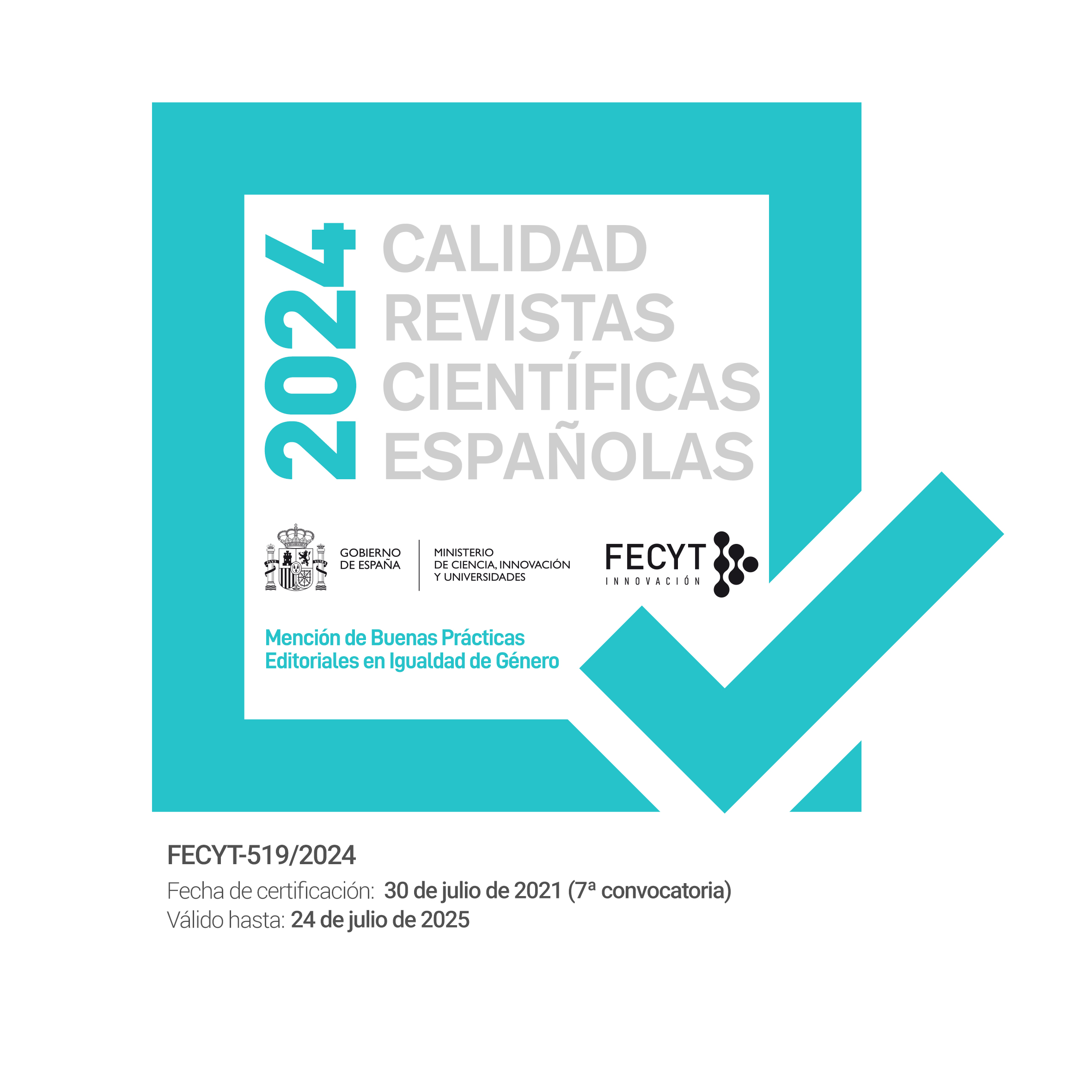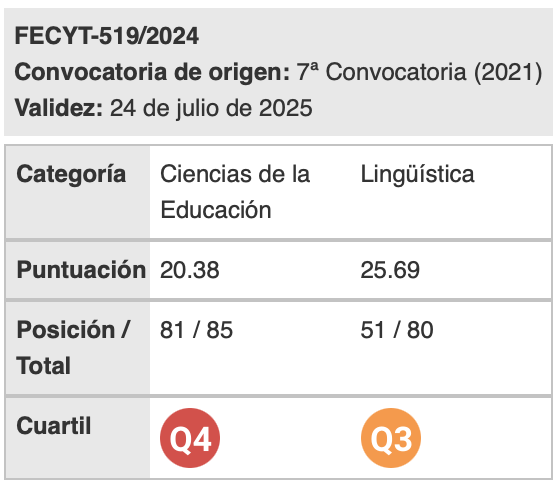Attitudes to English and motivation to continue learning English in a tertiary education setting
Resumen
This study investigates attitudes toward English, the primary language of international communication, and motivation of intermediate and advanced speakers of English required to pursue Business English as part of their university studies. Moreover, the study aims to establish the correlations between attitudes to English, different types of motivation and invested effort as a criterion related to motivated behaviour. Implications for teaching are finally provided on the basis of correlation and hierarchical regression analyses. Approximately 700 Croatian students of business and economics responded to a questionnaire based on earlier sociolinguistic (Erling, 2004; 2007) and L2 motivation research in the socio-psychological tradition (Dörnyei et al., 2006; Mihaljević-Djigunović, 1998). Descriptive and inferential analyses (factor, correlation and hierarchical multiple regression analyses) of the collected data revealed a positive attitude to English as a lingua franca alongside a preference for native English varieties. The perception of English as a threat was weak among our respondents. As regards motivational dimensions, the sample was characterised by integrative and two types of instrumental motivation: future benefits and past/present benefits. Although a positive attitude to English as a lingua franca positively correlated with invested effort, hierarchical multiple regression analysis revealed that effort could only be predicted on the basis of integrative motivation and experienced benefits. Generally speaking, the findings provide insights into attitudes and motivation of students of English for specific purposes in contexts where opportunities to use English for academic and professional purposes are limited.
Descargas
Citas
Baker, W. (2009). The cultures of English as a lingua franca. TESOL Quarterly 43, 567-592.
Bergroth, U.-M. (2008). Finnish Professionals with Limited English Proficiency: A Study of Language Attitudes and Language Use. Saarbrücken: VDM Verlag Dr. Müller.
Björkman, B. (2015). “Attitudes towards English in university language policy documents in Sweden.” In A. Linn, N. Bermel, & G. Ferguson (eds.), Attitudes towards English in Europe. English in Europe (pp. 115-118). Berlin: De Gruyter.
Ciscel, M.H. (2002). “Linguistic opportunism and English in Moldova”. World Englishes 21 (3), 403-419. doi:10.1111/1467-971X.00257
Csizér, K. & Dörnyei, Z. (2005). “The internal stracture of language learning motivation and its relationship with language choice and learning effort. ” The Modern Language Journal, 89, 19-36. doi:10.1111/j.0026-7902.2005.00263.x
Csizér, K. & Kormos, J. (2009). “Learning experiences, selves and motivated learning behaviour: a comparative analysis of structural models for Hungarian secondary and university learners of English.” In Z. Dörnyei & E. Ushioda (eds.) Motivation, language identity and the L2 self (pp. 98-119). Bristol: Multilingual Matters.
Csizér, K. i Lukács, G. (2010). The comparative analysis of motivation, attitudes and selves: The case of English and German in Hungary, System 38, 1-13.
Csizér, K. & Kontra, E.H. (2012). CELF, ESP, ENL and their effect on students’ aims and beliefs: A structural equation model. ” System 40 (1), 1-10.
https://doi:10.1016/j.system.2012.01.002
Dörnyei, Z. (1990). “Conceptualizing motivation in foreign language learning.” Language Learning, 40, 46-78. https://doi:10.1111/j.1467-1770.1990.tb00954.x
Dörnyei, Z. (1994). “Motivation and motivating in the second language classroom. ” Modern Language Journal, 78, 273-284. https://doi:10.1111/j.1540-4781.1994.tb02042.x
Dörnyei, Z. (2005). The psychology of the language learner. Individual differences in second language acquisition. London: Lawrence Erlbaum Associates, Publishers.
Dörnyei, Z. (2009). “The L2 motivational self system” in Z. Dörnyei & E. Ushioda (eds.), Motivation, language identity and the L2 self (pp. 9-42). Bristol: Multilingual Matters.
Dörnyei, Z. (2010). Questionnaires in second language research: Construction, administration, and processing (2nd ed.). London: Routledge.
Dörnyei, Z. & Csizér, K. (2002). “Motivational dynamics in second language acquisition. ” Applied Linguistics, 23, 421-462.
Dörnyei, Z., Csizér, K. & Németh, N. (2006). Motivation, Language Attitudes and Globalisation: A Hungarian perspective. Clevedon: Multilingual Matters.
Dörnyei, Z. & Ushioda, E. (2011). Teaching and Researching Motivation. 2nd edition.
Harlow: Longman.
Dörnyei. Z., & Ryan, S. (2015). The psychology of the language learner revisited. New York: Routledge.
Erling, E. J. (2004). Globalization, English and the German university classroom: a sociolinguistic profile of students of English at the Freie Universitaet Berlin. (Unpublished doctoral dissertation). University of Edinburgh, UK.
Erling, E.J. (2007). Local identities, global connections: affinities to English among students at the Freie Universitat Berlin. World Englishes 26 (2), 111-130.
Gardner, R. C. (1985). Social psychology and second language learning: The role of attitudes and motivation. London: Edward Arnold.
Gardner, R. C. (2001). “Integrative motivation and second language acquisition” in Z. Dörnyei & R. Schmidt (eds.), Motivation and second language acquisition (pp. 1-20). Honolulu: University of Hawai'i Press.
Gardner, R. C. & Lambert, W. R. (1972). Attitudes and motivation in second language learning. Rowley, MA: Newbury House.
Gardner, R. C. & MacIntyre, P. D. (1993). “A student's contribution to second-language learning. Part II: Affective Variables. ” Language Teaching, 26, 1-11.
https://doi:10.1017/S0261444800000045
Gnutzmann, C., Jakisch, J., Rabe, F. (2015). “Communicating across Europe. What German students think about multilingualism, language norms and English as a lingua franca.” In A. Linn, N. Bermel, & G. Ferguson (Eds.), Attitudes towards English in Europe. English in Europe (pp. 165-192). Berlin: De Gruyter.
Graddol, D. (2006). English next. The British Council.
Higgins, E. T. (1998). Promotion and prevention: Regulatory focus as a motivational principle. Advances in Experimental Social Psychology 30, 1-46.
House, J. (2002). “Developing pragmatic competence in English as a lingua franca” in K. Knapp & C. Meierkord (Eds.) Lingua franca communication (pp. 245-268). Frankfurt am Main: Peter Lang.
Irie, K. (2003). “What do we know about the language learning motivation of university students in Japan? Some patterns in survey studies.” JALT Journal 25(1), 86-100.
Jenkins, J. (2005). “ELF at the gate: the position of English as a Lingua Franca. ” Humanizing Language Teaching, 7, 2, 3–12. Available at: http://www.hltmag.co.uk/ mar05/idea.htm
Jenkins, J., 2006. Points of view and blind spots: ELF and SLA. International Journal of Applied Linguistics 16 (2), 137-162.
Kaylani, C. (1996) “The influence of gender and motivation of EFL learning strategy use in Jordan” in R. L. Oxford (ed.) Langugae Learning Strategies Around the World: Cross-cultural Perspectives. (pp. 75-89) University of Hawai'i, Honolulu.
Kim, T.-A. (2009). “The sociocultural interface between Ideal self and Ought-to self. ” in Z. Dörnyei & E, Ushioda (eds.) Motivation, language identity and the L2 self (pp. 274-295). Bristol: Multilingual Matters.
Kimura, Y., Nakata, Y. & Okumura, T. (2001). “Language learning motivation of EFL learners in Japan: A cross-sectional analysis of various learning milieus.” JALT Journal, 23, 47-68.
Lamb, M. (2004). “Integrative motivation in a globalizing world.” System 32, 3-9.
https://doi:10.1016/j.system.2003.04.002
MacIntyre, P. D., MacKinnon S. P. & Clément R. (2009). “The baby, the bathwater and the future of language learning motivation research.” In Z. Dörnyei & E. Ushioda (eds.) Motivation, language identity and the L2 self (pp. 43-65). Bristol: Multilingual Matters.
Markus, H. R. & Nurius, P. (1986). Possible selves. American Psychologist, 41, 954-
Martinović, A. (2017). “L2 motivation and L2 anxiety among non-language university majors” in K. Cergol Kovačević & S. L. Udier (eds.) Multidisciplinary Approaches to Multilingualism (pp 121-135). Franfurt am Main, Berlin, Bern, Bruxelles, New York, Oxford, Wien: Peter Lang Verlag.
McClelland, N. (2000). “Goal orientations in Japanese college students learning EFL.” In S. Cornwell & P. Robinson (eds.), Individual differences in foreign language learning:Effects of aptitude, intelligence, and motivation (pp. 99-115). Tokyo: Japanese Association for Language Teaching.
Mihaljević Djigunović, J (1998). Uloga afektivnih faktora u učenju stranog jezika. Zagreb: Filozofski fakultet, Sveučilište u Zagrebu.
Mihaljević Djigunović, J. (2007). “Croatian EFL learners’ affective profile, aspirations and attitudes to English classes. ” Metodika 8(14), 115-126.
Miyahara, M. (2015) Emerging Self-Identities and Emotion in Foreign Language Learning: A Narrative-Oriented Approach. Bristol: Multilingual Matters
Modiano, M. (1996). “The Americanization of Euro-English.” World Englishes 15(2),
-216. https://doi:10.1111/j.1467-971X.1996.tb00106.x
Murray, H. (2003). Swiss English teachers and Euro-English: attitudes to a non-native variety. Bulletin VALS-ASLA (Vereiningung für angewandte. Linguistik in der Schweiz) 77, 147-165.
Nielsen, P.M. (2003). “English in Argentina: a sociolinguistic profile.” World Englishes 22(2), 199-209. https://doi:10.1111/1467-971X.00288
Noels, K. A., Pelletier, L. G., Clément, R. & Vallerand, R. J. (2000) “Why are you learning a second language? Motivational orientations and self-determination theory.”Language Learning, 50, 57-85. https://doi:10.1111/0023-8333.00111
Preisler, B. (2003). “English in Danish and the Danes’ English.” International Journal of the Sociology of Language 159(1), 109-126. https://doi:10.1515/ijsl.2003.001
Seidelhofer, B. (2001). “Closing a conceptual gap: The case for a description of English as a lingua franca.” International Journal of Applied Linguistics 11, 133-157.
https://doi:10.1111/1473-4192.00011
Seidlhofer, B., 2003. Autour du concept d’anglais international: De l’ ‘anglais authentique’ a l’ ‘anglais re´aliste’?. (A concept of ‘international English’ and related issues: From ‘real English’ to ‘realistic English’?) Language Policy Division, Council of Europe, Strasbourg. Retrieved March 26 2016 from: http://www.coe.int/T/DG4/Linguistic/Source/SeidlhoferEN.pdf
Sinno, Z. S. (2008). The impact on language learning of Lebanese students' attitude towards English in the context of globalization and anti-Americanism. (Unpublished doctoral dissertation). University of Liecester, UK.
Stanojević, M. i Josipović Smojver, V. (2011). “Euro–English and Croatian National Identity: Are Croatian University Students Ready for English as a Lingua Franca?”Suvremena lingvistika 37(71), 105–130.
Sugita McEown, M., Noels, K.A. & K. Everhart Chaffee (2014). “At the Interface of the Socio-educational model, Self-determination theory and the L2 motivational self system models.” In K. Csizér & M. Magid (eds.), The impact of self-concept on language learning (19-50). Bristol: Mutilingual Matters.
Tardy, C. (2004). “The role of English in scientific communication: lingua franca or Tyrannosaurus rex?” Journal of English for Academic Purposes 3(3), 247-269.
https://doi:10.1016/j.jeap.2003.10.001
Timmis, I. (2002). Native speaker norms and international English: a classroom view. ELT Journal 56 (3), 240-249.
Ushioda, E. (2001). “Language learning at university: Exploring the role of motivational thinking.” In Z. Dörnyei & R. Schmidt (eds.) Motivation and second language acquisition (pp. 93-125). Honolulu, HI: University of Hawaii Press.
Ushioda, E. (2006). “Language motivation in a reconfigured Europe: Access, identity and autonomy.” Journal of Multilingual and Multicultural Development 27(2), 148-161. https://doi:10.1080/01434630608668545
Yang, A. & Lau, L. (2003). “Student attitudes to the learning of English at secondary and tertiary levels.” System 31(1), 107-123. https://doi:10.1016/s0346-251x(02)00076-3
Yashima, T. (2000). “Orientations and motivation in foreign language learning: A study of Japanese college students.” JACET Bulletin, 31, 121-134.
Yashima, T. (2009). “International posture and the ideal L2 self in the Japanese EFL context.” In Z. Dörnyei & E. Ushioda (eds.) Motivation, language identity and the L2 self (pp. 144-164). Bristol: Multilingual Matters.
Yashima, T., Zenuk-Nishide, L., Shimizu, K. (2004). The influence of attitudes and affect on willingness to communicate and second language communication. Language Learning, 54, 119-152.
Wächter B. & F. Maiworm (eds.). English-Taught Programmes in European Higher Education. The State of Play in 2014. Bonn: Lemmens Medien GmbH
http://www.aca-secretariat.be/fileadmin/aca_docs/images/members/ACA-2015_English_Taught_01.pdf
Accessed on: 25 May 2017
Warden, C. & Lin, H. H. (2000). “Existence of integrative motivation in Asian EFL setting.” Foreign Language Annals, 33, 535-47.
https://doi:10.1111/j.1944-9720.2000.tb01997.x
Widdowson, H.G. (1997). EIL, ESL, EFL: global issues and local interest. World Englishes 16 (1), 135-146.
Descargas
Publicado
Cómo citar
Número
Sección
Licencia
Aquellos autores/as que tengan publicaciones con esta revista, aceptan los términos siguientes:
- Los autores/as conservarán sus derechos de autor y garantizarán a la revista el derecho de primera publicación de su obra, el cuál estará simultáneamente sujeto a la Licencia de reconocimiento de Creative Commons que permite a terceros compartir la obra siempre que se indique su autor y su primera publicación esta revista.
- Los autores/as podrán adoptar otros acuerdos de licencia no exclusiva de distribución de la versión de la obra publicada (p. ej.: depositarla en un archivo telemático institucional o publicarla en un volumen monográfico) siempre que se indique la publicación inicial en esta revista.
- Se permite y recomienda a los autores/as difundir su obra a través de Internet (p. ej.: en archivos telemáticos institucionales o en su página web) antes y durante el proceso de envío, lo cual puede producir intercambios interesantes y aumentar las citas de la obra publicada. (Véase El efecto del acceso abierto).

Revista de Lenguas para fines específicos is licensed under a Creative Commons Reconocimiento-NoComercial-SinObraDerivada 4.0 Internacional License.























